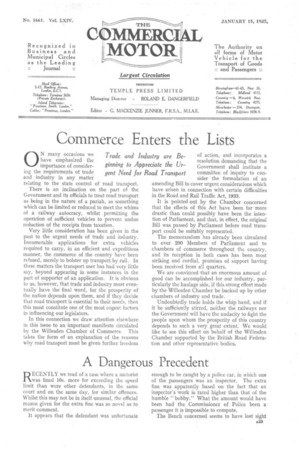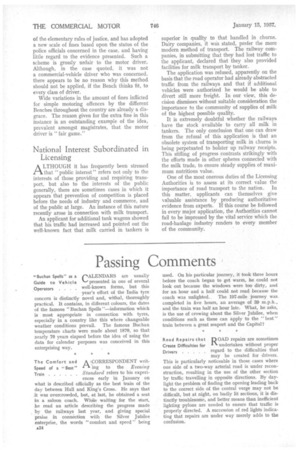A Dangerous Precedent
Page 25

Page 26

If you've noticed an error in this article please click here to report it so we can fix it.
RECENTLY we read of a case where a motorist was fined 10s. more for exceeding the speed limit than were other defendants, in the same court and on the same day, for similar offences. Whilst this may not be in itself unusual, the official reason given for the extra fine was so novel as to merit comment.
It appears that the defendant was unfortunate enough to be caught by a police car, in which one of the passengers was an inspector. The extra fine was apparently based on the fact that an inspector's work is rated higher than that of the humble "bobby." What the amount would have been had the Commissioner of Police been a passenger it is impossible to compute. The Bench concerned seems to have lost sight A23 of the elementary rules of justice, and has adopted a new scale of fines based upon the status of the police officials concerned in the case, and having little regard to the evidence presented. Such a scheme is grossly unfair to the motor driver. Although, in the case quoted, it was not a commercial-vehicle driver who was concerned, there appears to be no reason why this method should not be applied, if the Bench thinks fit, to every class of driver.
Wide variations in the amount of fines inflicted for simple motoring offences by the different Benches throughout the country are already a disgrace. The reason given for the extra fine in this instance is art outstanding example of the idea, prevalent amongst magistrates, that the motor driver is "fair game."
National Interest Subordinated in Licensing
ALTHOUGH it has frequently been stressed that "public interest" refers not only to the interests of those providing and requiring transport, but also to the interests of the public generally, there are sometimes cases in which it appears that prevention of competition is placed before the needs of industry and commerce, and of the public at large. An instance of this nature recently arose in connection with milk transport.
An applicant for additional tank wagons showed that his traffic had increased and pointed out the well-known fact that milk carried in tankers is superior in quality to that handled in churns. Dairy companies, it was stated, prefer the more modern method of transport. The railway companies, in submitting that they had lost traffic to the applicant, declared that they also provided facilities for milk transport by tanker.
The application was refused, apparently on the basis that the road operator had already abstracted traffic from the railways and that if additional, vehicles were authorized he would be able to divert still more freight. In our view, this decision dismisses without suitable consideration the importance to the community of supplies of milk• of the highest possible quality.
It is extremely doubtful whether the railways have the stock available to carry all milk in tankers. The only conclusion that one can draw from the refusal of this application is that an obsolete system of transporting milk in churns is being perpetuated to bolster up railway receipts. This stifling of progress contrasts strikingly with the efforts made in other spheres connected with the milk trade, to ensure steady supplies of maximum nutritious value.
One of the most onerous duties of the Licensing Authorities is to assess at its correct value the importance of road transport to the nation. In this matter, applicants can themselves give valuable assistance by producing authoritative evidence from experts. If this course be followed in every major application, the Authorities cannot fail to be impressed by the vital service which the road-haulage industry renders to every member of the community.




















































































